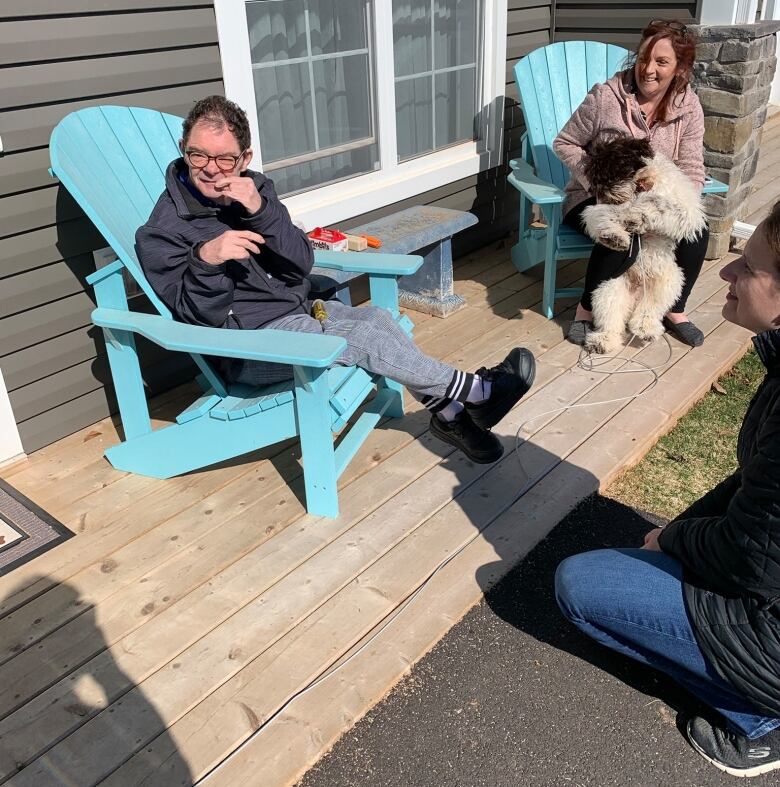Families caring for loved ones with disabilities finding full-time care a 'struggle' during pandemic
'The fact is you know, it's exhausting and it's tiring and people can't do it for 24/7'

Before COVID-19, Bonnie Bradley's brother Donnie White had a strict, daily routine the structure helped him as he has an intellectual disability and is non-verbal.
During the week, a taxiwould pick him up at the same time every morning tobring him to his day program, and then drop him off at home just after 3 p.m. when he was finished.
Every second Saturday, White would spend the afternoon with a respite worker, providing Bradley with a bit of a break.
Over the past four years she has become her brother's primary caregiver.
"He can feed himself, but other than that [he needs] total care," she said.
'He's missing the staff'
Since the pandemic, theservices White usually relies on have been scaled back to meetthe province's physical distancing requirements.
Thismeans that Bradley has become her brother's sole source of care, which has become a challenge for the both of them.
"The first couple of weeks were rough for him, like his sleep pattern was off just because his routine was off and he was upset," she said.

Bradley said she's trying to replicate her brother's daily routine at his day program, but said that's been tough because White loves to socialize.
"He works on these activities athis day program, but at home he doesn't want to do it," she said.
"He's missing the staff he worked with."
Prior to the pandemic, she said she could get things done during the day while her brotherwas at his program.
Now, she said she has to take him with her everywhere and said she worries she may be putting him at risk.
"Just the simple thing asgoing to the grocery store, right, where normally I could just go, run in, run out now I have to take him with me," she said.
"It's impacted me in that I don't have any time to myself. You know the only time I have to myself basically is when he's sleeping."
Day programs adapting
Julie Smith, executive director for the P.E.I. Association for Community Living, said she's hearing similar challenges from families who have become the primary source of care for their loved ones.
"The fact is you know, it's exhausting and it's tiring and people can't do it for 24/7.It's just, it's a struggle," she said.
"Our carefully established routines for our loved ones are obviously disrupted."
A lot of the clients that we deal with, they can't understand that, so it throws their routine right out of whack. Joshua Lavigne, TAJ Day Program
Smith said a common theme she's hearingis the need for respite workers and hopes there will be a way to provide this help, while still maintaining the health and safety of everyone.
"I think that's going to be something that we're going to have to look at, and where that funding comes from is going to be a discussion that we'll have to have," she said.
Smith said a number of day programs are changing how they operate to accommodate thechanges from COVID-19, whether that meansoffering services over the phone or dropping off care packages to clients.

Joshua Lavigne, one of the owners ofTAJ Day Program in Warren Grove, said since the pandemic, the program hasn't been able to use its facility.
He said staff are trying to help clients, especially those who don't have internet access, by picking up groceries or prescriptions.
Being able to have somebody you know, that can come in and watch him so I could have an hour to myself. Bonnie Bradley
"We're also there if they want to reach out and talkreally about anything," he said.
Lavigne said for clients with higher needs, caregivers are finding it challenging especially when trying to describe the consequences of COVID-19.
"A lot of the clients that we deal with, they can't understand that, so it throws their routine right out of whack," he said.
Bradley said she'd like to see more support around respite services for the time being.
"Being able to have somebody you know, that can come in and watch him so I could have an hour to myselfthat's the hard part," she said.
"That's the biggest challenge right now."
In an email to CBC, the province saysit continues to offer support to clients and families during this time"by providing customized case planning for essential respite and one-to-one supports."
It added that if a family requires assistance caring for their loved one with a disability"we would encourage them to reach out to their AAS(AccessAbility Supports)coordinator."
COVID-19: What you need to know
What are the symptoms of COVID-19?
Common symptoms include:
- Fever.
- Cough.
- Tiredness.
But more serious symptoms can develop, including difficulty breathing and pneumonia, which can lead to death.
Health Canada has built aself-assessment tool.
What should I do if I feel sick?
Isolate yourself and call 811. Do not visit an emergency room or urgent care centre to get tested. A health professional at 811 will give you advice and instructions.
How can I protect myself?
- Wash your hands frequently and thoroughly.
- Avoid touching your eyes, nose and mouth.
- Clean regularly touched surfaces regularly.
- Practisephysical distancing.
More detailed information on the outbreak is available on thefederal government's website.












_(720p).jpg)


 OFFICIAL HD MUSIC VIDEO.jpg)
.jpg)



























































































